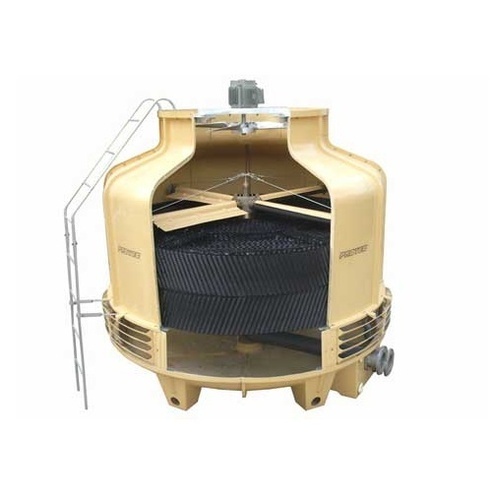Counter Flow Cooling Towers:
Counter flow water cooling tower design is where the air flow is directly opposite of the water flow. Air flow first enters an open area beneath the fill media and is then drawn up vertically. Counter flow cooling tower water is sprayed through pressurized nozzles and flows downward through the fill, opposite to the direction of the air flow. Counter flow cooling towers use, in general, low pressure spray nozzles to divide the hot water equally over the infill surface in fine droplets. A drift eliminator section above the water distribution rejects all the water in liquid form and keeps this in the circulating system. Only water evaporated in the air leaves the tower with the saturated air. A nozzle distribution is sensitive to changes in water flow thus it affects the overall efficiency. The air movement is vertically through the fill in counter flow to the downwards fall of the water. Counter flow cooling towers have in general a smaller footprint than cross flow towers but require a higher pump head due to the typical distribution system with nozzles.
Image:

Process:
Counter flow cooling tower the air moves vertically upwards through the fill while waterfalls vertically downwards. Film type fill is used and is suitable for all cooling load applications, however, it is more suitable for the application where cold water temperature is critical and water quality is good. The structure of the cooling towers is made of Treated Timber. Film type fill is made of PVC for normal water applications. These cooling towers are fitted with the fills of wider flute so that it can withstand most of the industrial water. The film type fill should be avoided for the applications where water has traces of oil and contaminated water. In the case of contaminated water PVC ‘V’ bars and grid can be used. Cooling towers are fitted with high efficiency mechanical such as axial flow fans, gear boxes and drive shafts.
Characteristic:
- The coldest water comes in contact with the driest air maximizing tower performance.
- Smaller footprint compared to other tower.
- Smaller tower height due to compact infill.
- More efficient air/water contact due to droplet distribution.
- Noise production due to spraying and falling water.
- Direct sunlight in the tower basin might trigger algae growth.
- Water distribution system might clog due to water borne debris.
- More complicated maintenance of the water distribution system.
- Drift loss due to droplet distribution system.
Features:
- Excellent FRP quality
- Efficient PVC fills
- Mist eliminators
- Uniform water distribution system
- Fan assembly
- Fan motor
- Water collection tank
- Easy installation.
- Durability
- Low maintenance
- Easy operations
- Scientifically and elegantly designed Fiber Glass Reinforced Plastic ( FRP) Cooling towers
- Precision fabrication ensures effective cooling power
- Economically priced, durable and dependable.
Applications:
- Gas plants
- Oil plants
- Chemical industry
- Power plants
- Fertilizer plants

